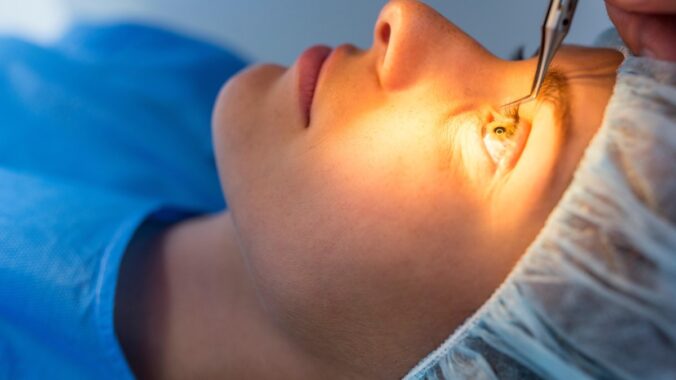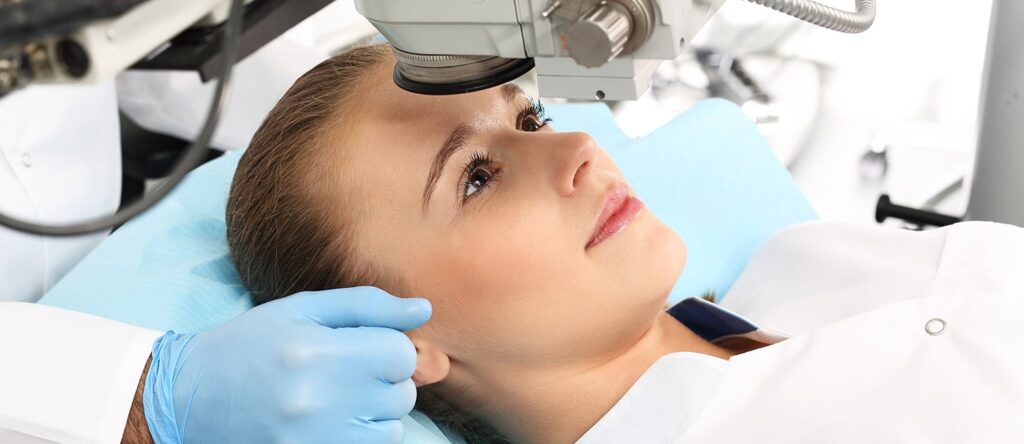Cataract surgery is a standard and safe outpatient procedure. However, that means patients may have to stay at the surgery center. Cataract surgery is a corrective vision procedure that gives cataract patients clear vision.
However, like all surgeries, cataract surgery may come with some complications. That may include double vision, blurred vision, or dry eye, which happens if the tears on the surface of the affected eye evaporate quickly.
It is common to have dry eye symptoms after cataract surgery. For example, a trusted study confirmed that 52 percent of cataract surgery participants developed dry eye symptoms after the surgery.
Another report exposed that most patients found dry eye was a side effect after 60 percent of cataract surgeries.
What are the causes of dry eyes after cataract surgery?
The primary reason involves the tear film in the eyes. The tear film is a delicate layer of liquid covering your eye’s surface. It is made of three layers.
The lipid layer stabilizes the tear film. That stops tears from evaporating, keeping the eye surface lubricated and smooth .

Cataract surgery makes the lipid layer thinner. Consequently, the tear film becomes unstable, causing dry eyes.
Dry eyes symptoms after cataract surgery may be related to the following:
- Corneal nerve damage
Corneal nerves are involved in tear production. Therefore, if the surgery damages your corneal nerve, it can reduce tear production.
- Light exposure
During cataract eye surgery, the surgeon will use a bright light microscope. The light might reduce goblet cells in the eyes, which lubricates the eye.

- Inflammation
Inflammation is a response after you have had surgery, including cataract surgery. In this case, inflammation in your eye could decrease tear production.
- Medicated eye drops
After surgery, you’ll likely need to use medicated eye drops to manage pain and swelling. However, the pain relievers and preservatives in the eye drops might affect healing, which can worsen dry eye.
Are there DIY remedies that can help alleviate dry eyes?
Home remedies may improve your symptoms if you have a mild case of dry eye.
1. Artificial tears:
Dry eyes need to be lubricated for patients to be in a relaxed state of vision. Therefore, your doctor will likely suggest that you apply something soft and liquid to stop the effects of dry eyes and give you clearer vision after the lens replacement surgery.
Artificial tears do not only work for a clear artificial lens. It can also work for your eyes when the natural lens capsule is still present.
Artificial tears is one of the most effective liquid ever recommended by surgeons. You can use it as eye drops to lubricate your eyes when you feel dry eyes. They are available in a nearby drugstore without a specific prescription.
2. Sunglasses
Initially, the ultraviolet rays from sunlight were harmful to the lens of your eye. But, the adverse effect of the sun on the eyes will be worse if you have dry eyes. For that reason, people need to wear glasses to protect their eyes when going out during the day after cataract surgery.

Note that eyeglasses are not serving the same functions as contact lenses. Though both can work for cloudy vision, your doctor must prescribe before use.
Wearing UV-protective sunglasses outside after the surgery will protect the eyes from the sun and wind, which are natural elements that affect the lens.
3. Blinking often
Another trick to help reduce the effect of dry eyes after cataract surgery is to blink when looking at a television screen, mobile phone, or computer.
Ideally, you need to stay away from screens for a few weeks after cataract surgery to aid in quick recovery. But, if you must work on a computer or read on your mobile phone, it is good to make sure you are often blinking. In addition, it can help lubricate your eyes.
4. Stay hydrated
Water can cure a lot of infections, including dry eyes. In other words, drinking the right amount of water every day will keep you in sound health.
You will feel less irritated in the eyes if you keep your body hydrated by drinking water from time to time. However, dehydration can worsen the symptoms of dry eyes and complicate your already affected vision.

Proper hydration gives you a clear lens and normal vision. It is also a way to prevent infection or avoid serious complications after cataract surgery.
5. Nutritional supplements
Ask your healthcare provider to recommend the best nutritional supplements to cure dry eyes. Your doctor would have examined your eyes and suggested the best supplements to ease inflammation in your eyes. common examples of supplements that can help are Vitamin D and Omega-3 acids.
Treatment for dry eyes
You may require medical treatment if you develop severe dry eye symptoms after cataract surgery. Based on the level of eye dryness, an eye doctor may prescribe the following medicines:
- Cyclosporine eye drops. This medication may help reduce your eye’s surface inflammation after cataract surgery and recovery.
- Lifitegrast eye drops. This medication can also help minimize inflammation.
- Punctal plugs. These plugs are inserted into the tear ducts to avoid tear drainage.
It’s important to remember that prescription dry eye medication may take weeks or months to work. So, you’ll still need to continue artificial tears when you begin taking prescription medication.
When should you see a doctor?
After cataract surgery, you’ll typically have regular checkups with an eye doctor. These checkups will allow the eye surgeon to monitor your recovery progress and look for symptoms of complications.
Visit your eye doctor in between your regular checkups if you experience the following:
- worsening eye dryness
- signs of an eye infection
- severe pain
- vision changes
- a painful or itchy sensation
Conclusion
It is common to develop dry eyes after cataract surgery. The reason is that the procedure called manual cataract surgery involves creating a small incision in the eyes to correct the affected lens. Unfortunately, this process can disrupt the tear film, which lubricates the surface of your eye.
Whereas laser-assisted cataract surgery is safer and more efficient. It addresses the affected lens of your eye and corrects your vision problems.
Typically, dry eye after cataract surgery is temporary. The complications of dry eye are worse during the first few days and then improve after a month of the surgery. But if the dry eyes persist or damage your vision, follow up with your eye doctor.
Your consistency during every follow-up appointment will determine how fast your eye heals during recovery. If you are consistent, it may take you a few weeks or about a month. Otherwise, you can struggle with double vision problems for almost three months.
As the case may be, your cataract surgeon may recommend that you use a protective shield like an eye patch, eye shield, or contact lenses to protect the operated eye from being exposed to sunlight when going out during the day.




